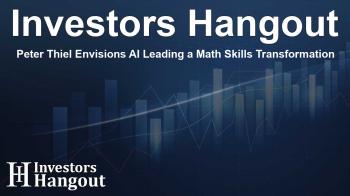Peter Thiel Envisions AI Leading a Math Skills Transformation

Peter Thiel’s Insight on AI and Math Skills
Peter Thiel, a prominent figure in the tech arena and former CEO of PayPal, has shared compelling insights regarding the interplay between artificial intelligence (AI) and the traditional emphasis on math skills. His thoughts were recently articulated during a discussion on the podcast "Conversations with Tyler."
A Shift in Math Emphasis
Thiel noted that as AI technologies become more advanced, they tend to alleviate the necessity for individuals to possess strong math skills. According to him, systems capable of performing complex calculations can render traditional math skills less relevant. This shift could mark the beginning of a long-overdue reassessment of how society views various skills essential for different professions.
The Societal Implications
The billionaire’s concerns echo a broader critique of the Silicon Valley paradigm, where a disproportionate weight has been placed on math-centric skills. Thiel questions if there is a genuine correlation between being adept in mathematics and excelling in fields like neurosurgery, suggesting that AI may be paving the way for a new kind of assessment of capability.
Historical Context: Comparisons to the Chess World
Thiel drew a fascinating parallel between the potential changes in mathematics and the historical moment when IBM’s Deep Blue defeated chess champion Garry Kasparov in 1997. This monumental win shifted perceptions about chess expertise, and Thiel speculates that mathematics might experience a similar transformation in light of AI advancements.
A Call for Rebalancing
His poignant remark, "Isn’t that a long overdue rebalancing of our society?" may resonate with many advocates for educational reform. Thiel insinuates that the traditional valuation of math skills could be recalibrated thanks to the ascension of AI.
Current AI Innovations
During the last year, we’ve witnessed a surge in AI applications that challenge conventional wisdom regarding problem-solving. For instance, Photomath, which was acquired by Google, enables individuals to tackle tasks ranging from basic arithmetic to advanced calculus seamlessly. Its growing popularity illustrates the shift towards leveraging technology for educational assistance.
Global AI Leaders
Furthermore, technological advancements from other major firms like Alibaba Group Holding Ltd have yielded impressive results. Their Qwen2-Math models reportedly excel in mathematical problem solving, even surpassing American counterparts. This underscores a fierce competition in the AI domain and a clear inclination towards mathematical automation.
The Role of AI in Education
Another notable mention is OpenAI’s ChatGPT, which, when combined with the Wolfram plug-in, achieved an astounding 96% on the U.K. A-level math exam—significantly outperforming its standalone version. These figures indicate a growing reliance on AI in educational settings.
Expert Opinions
Despite these advancements, some experts remain skeptical about the complete replacement of mathematicians by AI in the foreseeable future. The perception is that while AI can assist and augment problem-solving capabilities, the unique insights and creativity of human mathematicians are irreplaceable.
Concluding Thoughts
As we observe the increasing integration of AI into everyday life and its implications for math skills, it becomes evident that a transformation is underway. Peter Thiel’s remarks invite us to contemplate what the future will hold for assessing talents and abilities amid this technological revolution.
Frequently Asked Questions
1. What did Peter Thiel say about AI and math skills?
Thiel suggested that AI's rise could diminish the need for strong math skills as technology can perform complex calculations.
2. How does Thiel compare AI's impact to chess?
He likened it to the defeat of Garry Kasparov by IBM’s Deep Blue, indicating a shift in how society values skills.
3. What is Photomath, and how does it relate to the discussion?
Photomath is an AI tool enabling users to solve math problems easily, demonstrating the reliance on technology in learning.
4. Are AI models surpassing traditional methods in mathematics?
Yes, innovations like Alibaba's Qwen2-Math have reportedly outperformed U.S. math solutions.
5. Will AI replace mathematicians?
Experts believe that AI will assist but not entirely replace mathematicians due to the unique creativity humans bring to the field.
About Investors Hangout
Investors Hangout is a leading online stock forum for financial discussion and learning, offering a wide range of free tools and resources. It draws in traders of all levels, who exchange market knowledge, investigate trading tactics, and keep an eye on industry developments in real time. Featuring financial articles, stock message boards, quotes, charts, company profiles, and live news updates. Through cooperative learning and a wealth of informational resources, it helps users from novices creating their first portfolios to experts honing their techniques. Join Investors Hangout today: https://investorshangout.com/
Disclaimer: The content of this article is solely for general informational purposes only; it does not represent legal, financial, or investment advice. Investors Hangout does not offer financial advice; the author is not a licensed financial advisor. Consult a qualified advisor before making any financial or investment decisions based on this article. The author's interpretation of publicly available data shapes the opinions presented here; as a result, they should not be taken as advice to purchase, sell, or hold any securities mentioned or any other investments. The author does not guarantee the accuracy, completeness, or timeliness of any material, providing it "as is." Information and market conditions may change; past performance is not indicative of future outcomes. If any of the material offered here is inaccurate, please contact us for corrections.
